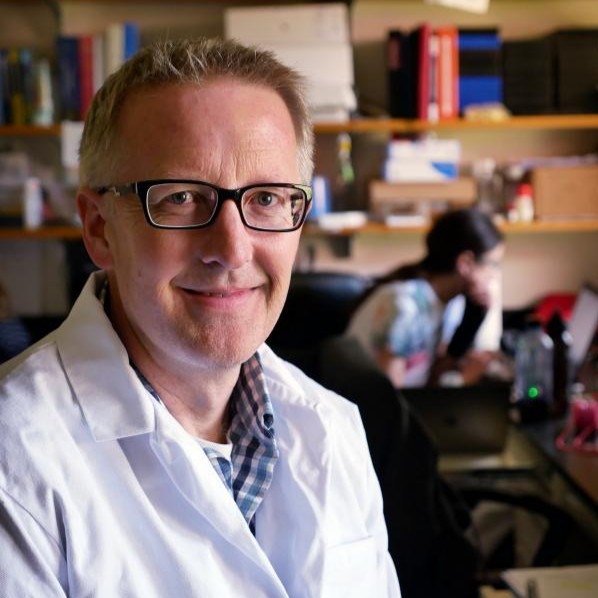Innovative approaches to treatments of anxiety and affective disorders
Imagine a treatment for anxiety disorders, affective disorders, or PTSD that worked like a flu vaccine, but rather than fighting a pathogen, this immunization allowed the patient a period of time free of anxiety, depression, or PTSD symptoms. This treatment would affect millions of patients in the United States alone. A shot could help prevent the long-term hardships that PTSD brings to millions of military servicemembers and victims of trauma.
This novel method of treatment is not as distant as one might think.
Dr. Christopher Lowry of the University of Colorado Boulder has been developing a treatment that is now ready for clinical trials. Lowry's research seeks to understand the neural mechanisms underlying stress-related physiology and emotional behavior, with a focus on the role of serotonin, a neurotransmitter that is believed to have a profound effect on both anxiety and depression, as well as trauma- and stressor-related disorders, such as PTSD.
Dr. Lowry is interested in understanding stress vulnerability and resilience from a whole-body perspective. His innovative research integrates several physiological processes, including serotonin systems, endocrine (hormone) systems, thermoregulatory systems, immune systems, and the microbiome.
Throughout the course of his research, Lowry has identified types of serotonin neurons with unique functions. Properties of serotonin release, uptake, and circuitry may contribute to differences in the development of anxiety, panic disorder, and depression. Understanding these pathways will aid in the development of new pharmaceutical drugs to target specific processes.
One intriguing hypothesis states that, as humans have moved further away from rural civilizations, they have lost contact with “old friends,” or microbes that have co-evolved with humans, and thus have lost important mediators that help keep the immune system in check. One of these microbes may be a type of soil bacteria called mycobacteria. Lowry has shown that one strain of this bacteria, Mycobacterium vaccae, can decrease inflammatory processes in the body and the brain, while simultaneously increasing stress resilience behaviors in rodent models. Dr. Lowry seeks to expand this research to many other strains of Mycobacteria, and may provide evidence for microbiome-directed therapies for the treatment of a variety of stress-related disorders, including posttraumatic stress disorder (PTSD).
Lowry also uses complementary medicinal approaches, such as whole-body infrared heating, to activate the body's own antidepressant mechanisms. This treatment, much like light therapy, may be an effective treatment for depressed patients to reestablish balance within the body.
Lowry also has an interest in the use of service dogs to improve functional outcomes for individuals with a diagnosis of PTSD.
Dr. Lowry's research has the potential to reduce human suffering, both for individuals affected by anxiety and affective disorders and their loved ones. Additionally, with the information gathered by Dr. Lowry's research, investigators could make targeted medications specifically for depression. By focusing on the development of innovative approaches to both the prevention and treatment of anxiety and affective disorders, as well as trauma- and stressor-related disorders, such as PTSD, Dr. Lowry and his counterparts are paving the way to novel treatments that, with increased accessibility, could have lasting impacts.
Clinical Trials
Clinical trials are a vital part of medical research. The following are projects that Dr. Lowry is personally involved in on his journey to improve the quality of life for people suffering from anxiety and other affective disorders.
-
Dr. Lowry is part of multiple clinical trials that investigate the use of alternative treatments for mental health disorders. One of these is whole-body heating, or infrared heating, which may stimulate physiological balance in the body and aid those with anxiety and depression
-
Another study seeks to investigate the effects of oral probiotics with anti-inflammatory and immunoregulatory properties on biological signatures of inflammation in US Veterans with a diagnosis of PTSD and mild traumatic brain injury (TBI). Probiotics interact with the gut and may help regulate neural, hormonal, and immune systems to ameliorate common symptoms of PTSD
-
Dr. Lowry is involved with research that aims to treat anxiety by use of sensory deprivation (float) tanks. He is interested in understanding how the body’s physiology changes after a single float tank session to relieve anxiety and feelings of stress
-
Dr. Lowry is part of a research team evaluating the effects of marijuana on biological signatures of inflammation and PTSD symptoms and in US Veterans
-
Dr. Lowry is Co-Founder of the Military and Veteran Microbiome Consortium for Research and Education (MVM-Core), the mission of which is “Advancing microbiome science and education to benefit military personnel, Veterans, and their families”
Bio
Dr. Christopher Lowry is an Associate Professor in the Department of Integrative Physiology and Center for Neuroscience. He received his Ph.D. in Zoology from Oregon State University in 1995 and subsequently trained at the University of Bristol, UK.
In 2002, he was awarded a prestigious Welcome Trust Research Career Development Fellowship. He joined the University of Colorado Boulder in 2007. He has received 2007 and 2010 Young Investigator Awards from NARSAD, The Brain & Behavior Research Foundation. He has authored or co-authored over 100 book chapters, review articles and journal articles.
His primary research interest is to understand the physiologic mechanisms underlying the control of anxiety states and emotional behavior, with a focus on the role of serotonergic systems.
In the News
Hygiene Hypothesis


